[Ashley Pollard is back with this month's report on the space and sci-fi scene across the Pond! Yes, I did use the term "sci-fi" advisedly…]

Last month a Red Star rose in the East. This month a Blue Star rose in the West as Alan Shepherd became the first American in space. He was aboard the Freedom 7 Mercury capsule launched atop the Mercury-Redstone 3 booster — showing it's possible to reach space without getting to orbit. While this may be seen as a bit of disappointment, it clearly demonstrates American caution in testing systems before clearing them for flight. Something I’m sure the astronauts approve of, as they sit atop what is a potential bomb if things go wrong.
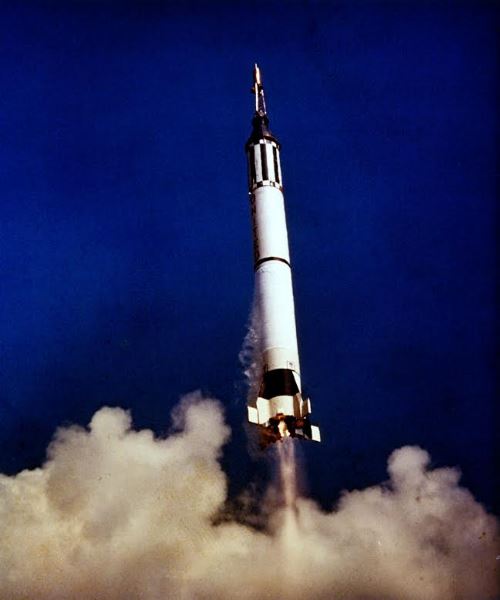
I understand that there’s another flight using the Redstone booster in July to look forward to, but my friend Gerry Webb, a member of the British Interplanetary Society, informs me the larger Mercury-Atlas booster is required to propel a man into orbit. However, I’m sure it won’t be long until an American astronaut orbits the Earth as both the Russian and American space agencies strive to be the first to achieve the next new record. I will be following the action as the Space Race hots up.
Meanwhile, at the last Thursday night’s London Circle meeting, once one had gotten through the frothing going on about memberships cards and the current fan feud that rolls on, we sat down and discussed the lamentable state of the British space programme. I braced myself with a Gin & Tonic, with ice and a slice, for the lamentation of the space geeks.
To summarize Great Britain’s role in space, we lag far behind both United States and the Soviet Union, our government having cancelled Blue Streak early last year, which was a medium-range ballistic missile that would’ve made a good basis for a British rocket. It was being tested at the Woomera Rocket Range in Australia (named, aptly, after an Aboriginal spear throwing aid). Woomera has plenty of room to fire rockets into space, unlike the Home Counties or anywhere else for that matter on the British Isles.
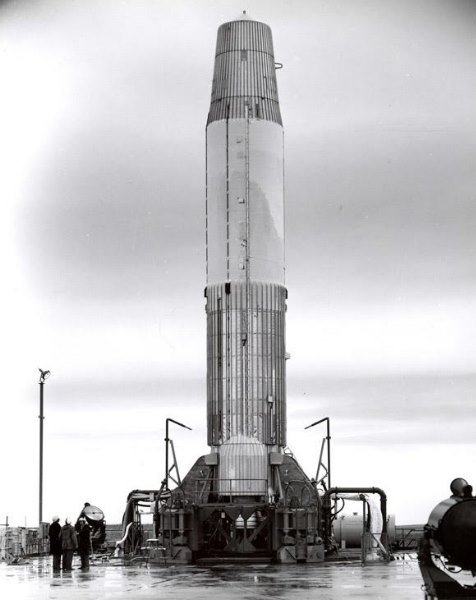
Shortly after announcing the cancellation of the Blue Streak our government changed its mind and said it would develop a two-stage rocket called Black Prince: using Blue Streak for the bottom stage and our Black Knight missile for the top. Gerry tells me that the names are generated from the British government’s Rainbow Code that uses a colour and a randomly generated word for aerospace projects. Unfortunately, for British fans of space rocketry, our government then went and cancelled the Black Prince project for being far too expensive.
I’m afraid that only leaves us the fictional British rocket programmes to fly the flag for us in space.
We start with the "British Experimental Rocket Group" from Quatermass by Nigel Kneale (the television show which wrapped up almost a decade ago, but which spawned two sequels). As space projects go, it can’t be said to have been a complete success for two very good reasons. First was the loss of ship on landing, and then there was the small matter of the crew dying and the mutated survivor wanting to chomp down on the inhabitants of the City of London.
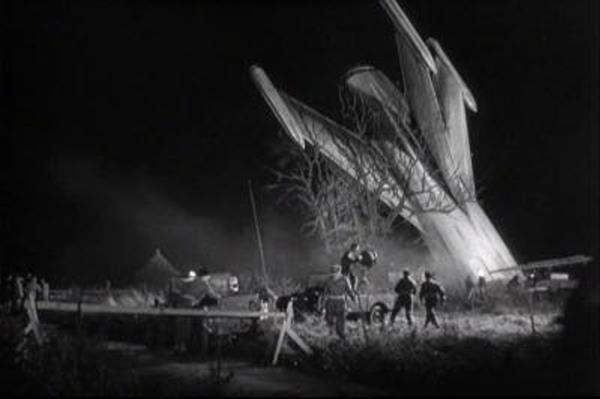
However, that still leaves us with Dan Dare, Pilot of the Future, which I haven’t mentioned before. He is the eponymous hero of the Eagle comic’s lead strip. Dan Dare is the lead test pilot of the "Interplanet Space Fleet", whose adventures in space are still delighting its readers after ten years of weekly installments. The series was created by Frank Hampson who consulted Arthur C. Clarke on the comic strips' science. While lots of spaceships have been lost, favourites like Dan Dare’s own Anastasia fly around the Solar system rescuing those in need of help, and defeating the various nefarious plans of enemies like the Mekon: large headed green alien overlords from Venus (and I expect you thought I would say Mars – still green though).
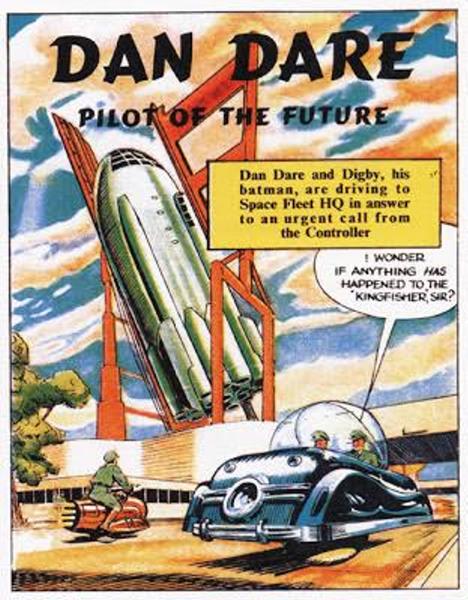
And finally we have UNEXA, the "United Nations Exploration Agency." This organization launches space missions and is the creation of Hugh Walters who has written a series of children’s science fiction that starts with Blast Off at Woomera. Ah that Woomera, which is no longer the centre of British aspirations in space. Sometimes fiction is better than fact.
Needless to say, most of those around the table with me had that look on their faces I always see when I mention something that’s considered off piste in polite science fiction company. And don’t get me started about the furore it causes if one dares to use Forrest J Ackerman’s term for our genre: Sci-Fi . I can only hope that in the future that people who enjoy reading and watching SF, including comics, will be accepted as fans like the rest of those who only read books and magazines . Besides I like pronouncing Sci-Fi as Skiffy, because skiffy rhymes with spiffy. Moreover, I think that reading SF is a smart thing as the world around us transforms from steam and steel into space and computers.
The other topic du jour has been George Blake née George Behar who was sentenced to 42 years in prison for being a spy for the Russians. Spying has become a topic of interest in my circles because of the link to secrets, and the nature of those secrets were the topic of a long discussion. Featuring prominently were atomic bombs, which were up until a few years ago the sole purview of those science fiction types who like to fantasize about going into space. I only comment about the spying, because as I said last time I’ve been watching the TV spy show The Avengers, which has just finished being broadcast for the season. As has Supercar for that matter.
I note that there are a lot of what would have been considered quite science fictional elements in Avengers. Perhaps not overtly showcased, but covertly in the use of science McGuffins to drive the stories forward. It should come as no surprise to hear the show being called Spy-Fi, which underscores my point. Language evolves, and as long as terms are not used to denigrate a genre, then I really don’t mind if you call what I read or watch Sci-Fi.
So, we now live in a world where science fiction can no longer be denied yet, we are still able to start endless bickering over whether it’s called science fiction, SF, Sci-Fi or even speculative fiction, a term I encountered when used by Robert A. Heinlein, though I understand he wasn’t the first to coin the expression. The point being is that I prefer to imagine a future where we can all be the best of what we can be, and that we live being non-judgemental and have unconditional positive regard for our fellow human beings whether they be right or wrong. Now isn’t that a science fictional ideal worth pursuing as we blast off into the Final Frontier.
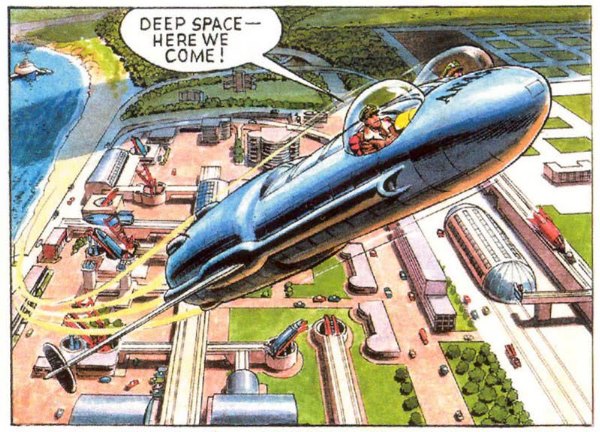

Thanks for the article. I love the Dan Dare pics – Quartermass didn't sound very British at all. A mutated British spaceman would, presumably, have British tastes in cuisine. Watch out, Kew Gardens.
And I think Hugh Walters' series should remain a classic for a long time.
Quatermass is more British is the TV series, which unfortunately have been over shadowed by the films where he's played by an American actor; to draw in more viewers. It's a pity that Hammer Films haven't made the third story into a film yet, it was my favourite of the three TV dramas. However, the Nigel Kneale books aren't really suitable for the young man I babysit, but I have got him reading Blast Off from Woomera.
As for Dan Dare, it's everything one could want in a space programme, even if it has some downsides like having to face up to the Mekon!
Alas, science fiction fans love to argue, and arguing over what to call our genre is probably second only to how exactly to define it. In my head, sci-fi is a subgenre that includes less serious things, like Buck Rogers or giant atomic insects. I'm less certain whether the S in SF should stand for science or speculative. The latter, at least, opens the door for things like historical what ifs such as Ward Moore's Bring the Jubilee. I can't warm up to skiffy, though. Sounds too much like skiffle, another genre which is enjoyable, but gets no respect within its art form.